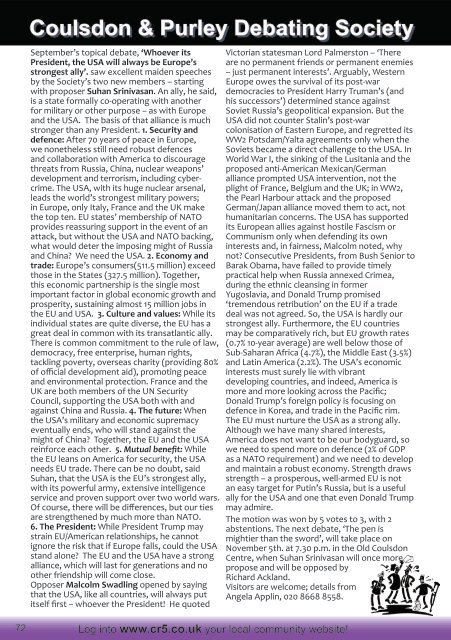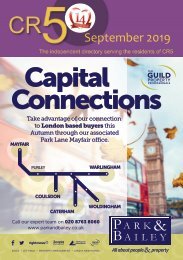CR5 Issue 161 Oct 2018
A local community magazine delivered free to 11,600 homes every month in the CR5 postcode. Contains local business advertising, interesting reads, Competitions, What's on in the Community and puzzles.
A local community magazine delivered free to 11,600 homes every month in the CR5 postcode. Contains local business advertising, interesting reads, Competitions, What's on in the Community and puzzles.
You also want an ePaper? Increase the reach of your titles
YUMPU automatically turns print PDFs into web optimized ePapers that Google loves.
September’s topical debate, ‘Whoever its<br />
President, the USA will always be Europe’s<br />
strongest ally’. saw excellent maiden speeches<br />
by the Society’s two new members – starting<br />
with proposer Suhan Srinivasan. An ally, he said,<br />
is a state formally co-operating with another<br />
for military or other purpose – as with Europe<br />
and the USA. The basis of that alliance is much<br />
stronger than any President. 1. Security and<br />
defence: After 70 years of peace in Europe,<br />
we nonetheless still need robust defences<br />
and collaboration with America to discourage<br />
threats from Russia, China, nuclear weapons’<br />
development and terrorism, including cybercrime.<br />
The USA, with its huge nuclear arsenal,<br />
leads the world’s strongest military powers;<br />
in Europe, only Italy, France and the UK make<br />
the top ten. EU states’ membership of NATO<br />
provides reassuring support in the event of an<br />
attack, but without the USA and NATO backing,<br />
what would deter the imposing might of Russia<br />
and China? We need the USA. 2. Economy and<br />
trade: Europe’s consumers(511.5 million) exceed<br />
those in the States (327.5 million). Together,<br />
this economic partnership is the single most<br />
important factor in global economic growth and<br />
prosperity, sustaining almost 15 million jobs in<br />
the EU and USA. 3. Culture and values: While its<br />
individual states are quite diverse, the EU has a<br />
great deal in common with its transatlantic ally.<br />
There is common commitment to the rule of law,<br />
democracy, free enterprise, human rights,<br />
tackling poverty, overseas charity (providing 80%<br />
of official development aid), promoting peace<br />
and environmental protection. France and the<br />
UK are both members of the UN Security<br />
Council, supporting the USA both with and<br />
against China and Russia. 4. The future: When<br />
the USA’s military and economic supremacy<br />
eventually ends, who will stand against the<br />
might of China? Together, the EU and the USA<br />
reinforce each other. 5. Mutual benefit: While<br />
the EU leans on America for security, the USA<br />
needs EU trade. There can be no doubt, said<br />
Suhan, that the USA is the EU’s strongest ally,<br />
with its powerful army, extensive intelligence<br />
service and proven support over two world wars.<br />
Of course, there will be differences, but our ties<br />
are strengthened by much more than NATO.<br />
6. The President: While President Trump may<br />
strain EU/American relationships, he cannot<br />
ignore the risk that if Europe falls, could the USA<br />
stand alone? The EU and the USA have a strong<br />
alliance, which will last for generations and no<br />
other friendship will come close.<br />
Opposer Malcolm Swadling opened by saying<br />
that the USA, like all countries, will always put<br />
itself first – whoever the President! He quoted<br />
Victorian statesman Lord Palmerston – ‘There<br />
are no permanent friends or permanent enemies<br />
– just permanent interests’. Arguably, Western<br />
Europe owes the survival of its post-war<br />
democracies to President Harry Truman’s (and<br />
his successors’) determined stance against<br />
Soviet Russia’s geopolitical expansion. But the<br />
USA did not counter Stalin’s post-war<br />
colonisation of Eastern Europe, and regretted its<br />
WW2 Potsdam/Yalta agreements only when the<br />
Soviets became a direct challenge to the USA. In<br />
World War I, the sinking of the Lusitania and the<br />
proposed anti-American Mexican/German<br />
alliance prompted USA intervention, not the<br />
plight of France, Belgium and the UK; in WW2,<br />
the Pearl Harbour attack and the proposed<br />
German/Japan alliance moved them to act, not<br />
humanitarian concerns. The USA has supported<br />
its European allies against hostile Fascism or<br />
Communism only when defending its own<br />
interests and, in fairness, Malcolm noted, why<br />
not? Consecutive Presidents, from Bush Senior to<br />
Barak Obama, have failed to provide timely<br />
practical help when Russia annexed Crimea,<br />
during the ethnic cleansing in former<br />
Yugoslavia, and Donald Trump promised<br />
‘tremendous retribution’ on the EU if a trade<br />
deal was not agreed. So, the USA is hardly our<br />
strongest ally. Furthermore, the EU countries<br />
may be comparatively rich, but EU growth rates<br />
(0.7% 10-year average) are well below those of<br />
Sub-Saharan Africa (4.7%), the Middle East (3.5%)<br />
and Latin America (2.2%). The USA’s economic<br />
interests must surely lie with vibrant<br />
developing countries, and indeed, America is<br />
more and more looking across the Pacific;<br />
Donald Trump’s foreign policy is focusing on<br />
defence in Korea, and trade in the Pacific rim.<br />
The EU must nurture the USA as a strong ally.<br />
Although we have many shared interests,<br />
America does not want to be our bodyguard, so<br />
we need to spend more on defence (2% of GDP<br />
as a NATO requirement) and we need to develop<br />
and maintain a robust economy. Strength draws<br />
strength – a prosperous, well-armed EU is not<br />
an easy target for Putin’s Russia, but is a useful<br />
ally for the USA and one that even Donald Trump<br />
may admire.<br />
The motion was won by 5 votes to 3, with 2<br />
abstentions. The next debate, ‘The pen is<br />
mightier than the sword’, will take place on<br />
November 5th. at 7.30 p.m. in the Old Coulsdon<br />
Centre, when Suhan Srinivasan will once more<br />
propose and will be opposed by<br />
Richard Ackland.<br />
Visitors are welcome; details from<br />
Angela Applin, 020 8668 8558.<br />
72 Log into www.cr5.co.uk your local community website!

















